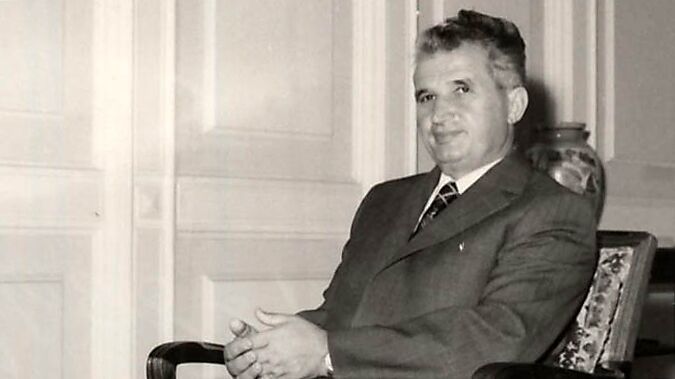
Nicolae Ceausescu Invited Herbert W. Armstrong Behind the Iron Curtain
“For the first time in my life, I am en route to a Communist country, behind the ‘Iron Curtain.’ I am going to Bucharest, Romania, as a guest of the country, at the personal invitation of President Nicolae Ceausescu. I am looking forward to this visit with considerable interest, since I have never been in a Communist country before,” wrote Herbert Armstrong to co-workers on Oct. 27, 1971.
This visit took place under dramatically different global conditions than those extant today. Eastern Europe was Soviet property. Romania had Communist neighbors Bulgaria, Yugoslavia, Hungary, Ukraine and Moldova wrapped around it like a cloak of protection, and the country boasted the trade gem of the Danube Delta and key port access to the Black Sea.
The following day, Thursday, October 28, the internationally recognized ambassador for world peace arrived in the Soviet-aligned nation. “He spent three days in Bucharest, Romania, as a guest of the government. … Mr. Armstrong met with key officials from the Romanian Writers Union (an organ of the government which controls all publishing of newspapers, books, etc.) including its president, Mr. Zaharia Stancu …” the Worldwide News recollected (Nov. 12, 1973).
By this time, Stancu was already established in his country as a famed, prizewinning writer, poet and philosopher. During World War ii, he resisted the fascist administration and subsequently served time as a political prisoner. He rose again to head the national theater, and then presided over the writers union. He died two years after meeting Mr. Armstrong.
For this historic trip, Mr. Armstrong brought key executive officials. Accompanying him were his general counsel and financial adviser, the director of Asian studies and logistics for his international meetings with world leaders, and senior advisers from Ambassador College in England and America.
Founded by Mr. Armstrong in February 1934, the Plain Truth had grown to one of the world’s largest mass circulation magazines with over 2 million subscribers by the time of his foray behind Europe’s iron curtain. The publication dubbed “a magazine of understanding” formalized him as a globally respected publisher of a unique monthly message announcing the advance good news of a supreme government to usher in an unprecedented era of prosperity, production and peace.
Conversely, Romania’s history to this point had been one of exhaustive subjugation by overlords: Romans, Goths, Huns, Avars, Bulgars, Magyars and Mongols. Thereafter, they were ruled by the Ottoman Empire; fought against the Holy Roman Empire; fell to Turkish domination, Austrian peacekeepers and Russian expansionism; before declaring itself a kingdom. During this time, internal strife abounded in opposition to the monarchy.
At the start of World War i, Romania allied with the central powers but was covered by the dark shadow of invading Austrian and German troops. After the conflict, ineffectual kings battled growing fascism and overt actions from Russia as the national army grew in power, ultimately declaring dictatorship.
Romania allied with Hitler’s Germany in World War ii to fight against Stalin’s Russia. This resulted in heavy casualties and subsequent overrun by the resurgent monarchists, who swiftly surrendered to Russia. The war came at the cost of over 750,000 Romanian Jewish lives, Soviet communist occupation and relegation to satellite status under the bear claw of the Moscow-led ussr.
Mr. Armstrong, after relentless international travel, speaking engagements and meetings with world leaders, would later return to the country for rest periods as a guest of its famed health clinic located just north of Bucharest in the town of Otopeni. In 1952, the government ordered the establishment of The Institute of Gerontology and Geriatrics. In 1964, the World Health Organization recognized the clinic as a leader in its field. In 1974, it was branded a National Institute, and two years later the 80-acre facility was renovated, expanded and renamed in honor of Prof. Ana Aslan, its leading Cold War medical practitioner.
Romania received God’s gospel message personally from Mr. Armstrong in 1971. At that time he continued to sound the warning as a witness, which he had done since 1934. That message heralded a resurgent Germany rising from the ashes of defeat in World Wars i and ii to again dominate Europe in its efforts to revive the medieval Holy Roman Empire a seventh and final time.
This ambassador of peace looked to the clear light of Bible prophecy, declaring that message by all means possible at his disposal. The fact that he was invited behind the Iron Curtain by a sitting Communist Party leader underscores the miraculous open doors God provided this man of eloquence, tact and diplomacy, a true ambassador of a far better coming kingdom.
By the time of his death, Mr. Armstrong had visited a number of Communist countries in Europe, and become the first church leader to visit China. Even those whose minds were closed to God’s family vision saw something different in this most unique of men. The wonderful purpose behind his acceptance of Romania’s invitation was to witness to that country’s leadership of the gospel message of Christ, heralding His return and establishment of His Kingdom over all national dogmas and doctrines (Matthew 24:14).
The good news for Romania is that very soon it will forever break the shackles of domination by a Communist bloc or Holy Roman Empire, and rejoice under God’s loving divine government (Isaiah 2:2-4; Micah 4:1-3). Request our free booklet He Was Right. It highlights the fulfilled prophecies of God as declared by Herbert W. Armstrong.
